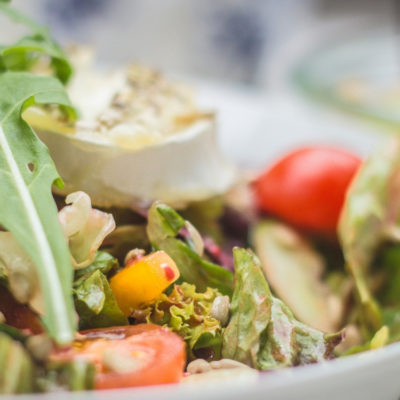When I was a kid nuts were kept for special times – expensive cashews were served at Christmas time while salted peanuts were eaten by adults at barbies. Nowadays a wide range of nuts are available at reasonable prices so we can use them in our everyday meals and snacks. And they provide our bodies with protein, healthy fats, fibre and phyto-nutrients.
Nuts are a wonderful addition to our everyday eating, try some of these ideas:
- Sprinkle them on your breakfast cereal or smoothie bowl
- Snack on a handful
- Puree them to a butter consistency and spread on bread
- Add them to curries, stir fries and salads
- Use nut meal instead of or in addition to flour in baking
- Include nut oils in salad dressings
- Make your own plant-based cream or soft cheese with cashews.
But why would we bother to eat nuts?
Firstly, they taste great! They add texture and sometimes crunch. And studies have also shown that eating nuts is associated with a reduction in heart disease.
And while more research is needed, preliminary studies have provided some evidence to indicate that nuts may play a role in:
- Reducing the risk of gall stones
- Reducing age related macular degeneration
- Maintaining bone health
- Slowing brain aging
- Reducing cancer risk
- Reducing inflammation.
Safety concerns are limited to the infrequent occurrence of nut allergy.
A serve of nuts each day is not associated with weight gain and may also help reduce the risk of overweight. The healthy fats in nuts can help you feel fuller and lowers the glycaemic index (GI) of meals, which can help you to manage your appetite.
Nut nutrition
Like other plant foods, nuts provide a range of nutrients, including large quantities of healthy monounsaturated and polyunsaturated fats (49–74% total fat depending on the nut variety; except chestnuts which are low fat), and moderate amounts of protein (9–20%).
Nuts contain:
Unsaturated fats – these “good” fats – both monounsaturated and polyunsaturated fats — lower LDL or “bad” cholesterol levels.
Plant-based omega-3 fatty acid – found especially in walnuts, this fat is a healthy type of fat that increases “good” HDL cholesterol and reduces inflammatory markers.
Fibre – all nuts contain fibre, which is great for keeping the bowels moving, helps to lower your cholesterol, and makes you feel full, so you eat less.
Plant sterols – some nuts contain plant sterols, a substance that can help lower your cholesterol by reducing the reabsorption of cholesterol in the gut.
L-arginine – a type of amino acid; l-arginine is converted to nitric oxide in the body which helps keep blood vessels elastic, thereby reducing the risk of atherosclerosis (hardening of the arteries), making artery walls more flexible and less prone to blood clots that can block blood flow.
Phyto-nutrients, like the antioxidant vitamins and minerals, vitamin E, copper, manganese, selenium and zinc, and other antioxidant compounds such as flavonoids and resveratrol that reduce oxidation and inflammation.
How much is a serve of nuts?
A small handful or 30g of nuts is considered a serve; this is about:
- 20 almonds
- 15 cashews
- 20 hazelnuts
- 15 macadamias
- 15 pecans
- 2 tablespoons of pine nuts
- 30 pistachio kernels or
- 9 walnut kernels
While, the Australian Dietary Guidelines recommend nuts as healthy alternatives to meat and other animal protein foods, a serve of nuts each day is recommended for good health; an additional 10g of nuts a day can be used in place of other healthy fat foods such as oil. For children under 3 years nut butters are recommended as nuts may be a choking hazard.
Choose raw or dry roasted nuts rather than those cooked in oil or salted or sugared. I usually buy raw nuts and dry roast them as I need them. Take care not to burn them when you roast them.
Does it matter what kind of nuts you eat?
The type of nuts you choose to eat probably doesn’t matter much, so choose a variety. Most nuts appear to be generally healthy, though some have more heart healthy nutrients than others, for example walnuts contain high amounts of omega-3 fatty acids. Almonds, macadamia nuts, hazelnuts and pecans are other nuts that appear to be quite heart healthy. And peanuts — which are technically not a nut, but a legume, even though we tend to eat them like a nut — seem to be relatively healthy. The nutritional composition of the peanut is close to that of tree nuts, and there is research showing peanuts have health benefits, too. Chestnuts are tree nuts but nutritionally they are different again; they are rich in low glycaemic index carbohydrates and low in fat making them more like a grain than a tree nut.
Every nut variety has its own unique combination of nutrients and is generally rich in a few nutrients – check out these nuts nutrient profiles:
- Almonds: protein, calcium and vitamin E
- Brazil nuts: fibre and selenium
- Cashews: non-haem iron
- Chestnuts: low GI, fibre and some vitamin C
- Hazelnuts: fibre, potassium, folate and vitamin E
- Macadamias: has the highest amount of monounsaturated fats of all nuts, plus thiamine and manganese
- Pecans: fibre and phyto-nutrients
- Pine nuts: vitamin E and arginine, an amino acid
- Pistachios: protein, potassium, plant sterols and the phyto-nutrient resveratrol
- Walnuts: alpha linoleic acid, a plant omega 3, and phyto-nutrients
Nuts are naturally low in sodium, contain potassium and most contain a little carbohydrate in the form of natural sugars.
Roasting nuts concentrates their flavour and makes them crunchy; it reduces their water content and the concentration of several B group vitamins as these vitamins are not heat stable.
What about nut oils? Are they healthy, too?
Nut oils are also a good source of healthy nutrients, but they lack the fibre found in whole nuts.
You can use nut oils in homemade salad dressing or in cooking. When cooking with nut oils, if you overheat them they can become bitter, so don’t overheat them. Just like with nuts, use nut oil in moderation.
To sum up:
For good health eat a serve (30g) of nuts everyday
Choose a variety of different nuts as they each contain different nutrients
Preferably, choose raw or dry roasted nuts
Avoid nuts if you have an allergy to them.
get dale’s support now register for weekly tips






Comments (0)